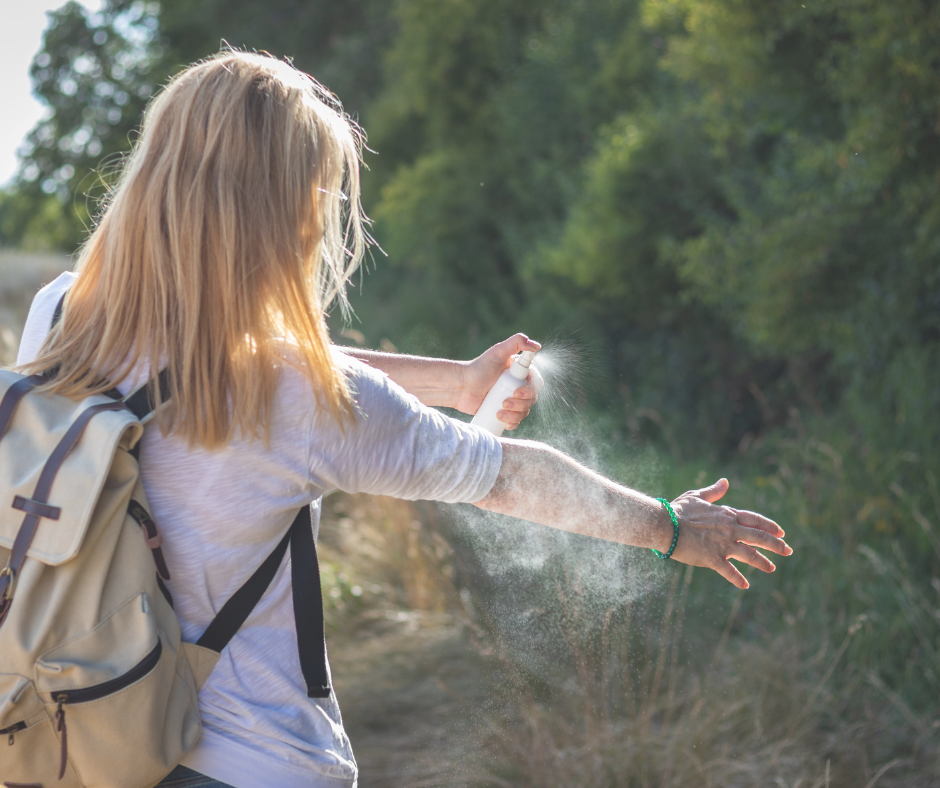The struggle is real when it comes to finding effective insect repellents, lip balm and sunscreen protection that is also environmentally friendly. With dangerous UV levels and disease-carrying insects, we often reach for ones containing harmful ingredients- to us and the environment.
The following information breaks down the alternatives so you can make a more informed decision when choosing what is best for you, your family, and the environment.
Insect repellent options
Since 1946, DEET (N-diethyl-3-methylbenzamide), is the most well-known and used chemical insect repellent on the market. Statistics show this product is in use to the tune of 200 million times annually! Other chemical insect repellents include picaridin, IR3535, MGK-326, and MGK-264. While there is evidence that some insects (mosquitos) are starting to become resistant to DEET, science continues its fight against annoying, disease carrying insects.
Clothing pre-treated with permethrin is another option. The chemical is applied to clothing and will last the life of the garment. Keeping yourself covered, even with protective face netting, can add a non-chemical layer of protection.
Botanical/plant-derived
These are becoming more popular due to their low toxicity. Unfortunately, they have not shown to be as effective as the chemical options. For more natural products, choose ingredients with citronella oil, soybean oil, rose oil, geranium oil, lavender, rosemary extract, peppermint oil, catnip extract, and lemon eucalyptus oil.
Bites
Despite our best efforts, insects seem to find a way past our barricades. Many products on the market claim to aid in itching, pain relief, and help with healing. In addition to many after-bite creams, heated devices and extractors can be effective. Always check for ticks and contact a medical provider if bitten.
And please remember Epi-pens when recreating outdoors. Bees are another creature found in the wilderness that can cause problems for outdoor enthusiasts with allergies.
Sun protection
This seems to be one area where the government and the naturalists align!
Mineral sunscreens containing zinc oxide and titanium oxide are deemed safe by the FDA. They don’t have the negative impacts on coral reefs that oxybenzone and octinoxate do. Avobenzone is another ingredient you may see listed in your sunscreen and it is considered coral reef safe. Dermatologists recognized the lotions take a bit more work to apply, but they offer better coverage than aerosols. Dermatologists also recommend applying sunscreen before bug sprays and reapplying as the product directs.
Did you know?
The FDA continues to work with researchers to evaluate the safety of additional sunscreen ingredients. Since 2014 the agency has had a backlog of pending ingredients (many of which are already approved in Europe). Congress introduced the Sunscreen Innovation Act in 2014 in hopes the FDA can move forward in this effort.
Clothing
UPF-rated sun protective apparel is made with a dense weave and/or a chemical finish to prevent the sun’s ultraviolet rays from penetrating the garment. Hats, umbrellas, and even lightweight gloves are now available with UPF protection. And of course, don’t forget those sunglasses and lip-balm with sunscreen! Shade shelters are another popular item.
Lip balms
Eco-friendly lip balms aim to leave behind zero waste (from container to ingredients), everything should be recyclable, compostable and/or biodegradable. Avoid ones with plastic packaging or synthetic ingredients. Instead, look for those containing essential oils, and other natural non-toxic ingredients.
After sun
Research has shown the aloe vera plant to be the most helpful in healing sunburn. The bottled 100% aloe vera clear gel is the best choice for mild to moderate sunburns if you don’t own an aloe vera plant.

Sawyer’s tip
Can I use my sunscreen and bug spray on my dog?
- Do not apply any sunscreen or insect repellent product to your pet that has not been labeled specifically for use on animals. If ingested, human-grade sunscreen or bug sprays can make your dog very sick.




